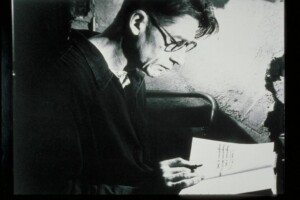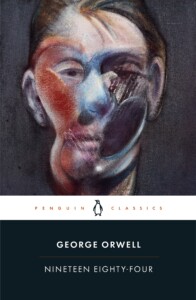A Witness in Nineveh Sarah Ditum

Share this
Here we are, inside the whale. A friend texts: maybe having children was a mistake, they confess.
Look at the world we’ve given them, says my friend: a planet of fire and flood, its systems poisoned with carbon dioxide, degenerating inexorably but unpredictably, so we can’t even guess where the worst will be and try not to be there. And look at the leaders supposed to address this: venal mediocrities for the most part, contorting and circumventing institutions in their own self-interest, because it turned out there was nothing to stop them but their own decency, and they have none.
My friend is telling me and not their spouse, because it’s the kind of thing you can’t admit to your spouse. What would be worse – that they disagree with you, and realise they’ve bound themselves by law and blood to a hysteric? Or that they agree with you, and from then on, every time you look at each other you see a fellow conspirator in the plot to bear your children into certain catastrophe? What can any one person do anyway about events that, though human-made, are so vastly beyond the human scale, so unimaginable in their consequences? If you’re right about how bad things are, nothing you can do individually will practically matter. The most tolerable course is to let go of futile striving and just exist.
George Orwell, writing in 1940 (and with more reason than me and my friend to believe that liberalism was dead, although less cause to worry about global extinction) compared this attitude to that of Jonah in the Bible story, who finally ceases struggling against his fate once he has been swallowed by the whale. ‘Progress and reaction have both turned out to be swindles,’ wrote Orwell. ‘Seemingly there is nothing left but quietism – robbing reality of its terrors by simply submitting to it. Get inside the whale – or rather, admit you are inside the whale (for you are, of course). Give yourself over to the world-process, stop fighting against it or pretending that you control it; simply accept it, endure it, record it.’
The essay ‘Inside the Whale’ is a work of criticism, largely concerned with what makes Henry Miller’s Tropic of Cancer artistically successful when most literature of the 1930s struck Orwell as at best ’emotionally spurious’. Miller’s novel, he wrote, captured a ‘passive, non-cooperative attitude’ that was at large, though little acknowledged within art: ‘Whether or not it is an expression of what people ought to feel, it probably comes somewhere near to expressing what they do feel.’ But Miller was not the only writer of the thirties to have tried recording life in the whale.
By the time he published ‘Inside the Whale’, Orwell had written four novels about inert, unhappy characters: Burmese Days (1934), A Clergyman’s Daughter (1935), Keep the Aspidistra Flying (1936) and Coming Up for Air (1939). They are, largely, not very good, and ‘Inside the Whale’ is tacitly as much about his own failure as about Miller’s achievement. Two of them he disavowed entirely shortly before the end of his life, writing in a letter to a friend that A Clergyman’s Daughter ‘was written simply as an exercise and I oughtn’t to have published it, ditto when I wrote Keep the A’. Both those novels are, it’s fair to say, significantly flawed, though neither is quite as difficult to read in the twenty-first century as Burmese Days.
Orwell’s debut novel suffers from something which is arguably also to the author’s credit: he includes Asian characters in his critical portrayal of British colonial life in Burma, as seen through the eyes of dissolute timber merchant John Flory (the novel draws heavily on Orwell’s experience in the Burmese colonial police). Those Asian characters read now as grotesque and racist stereotypes. Orwell can be defended on the basis that he shows the deforming effects of colonisation in all the novel’s characters, but when the characters are non-white, those deformations are presented in queasily racialised terms.
This is most blatant in the case of U Po Kyin, a ‘fat, rich and feared’ Burmese officer employed by the British colonial forces, who is offered as the novel’s primary antagonist and is the very archetype of the ‘scheming oriental’ caricature. A novel can contain, even endorse, dated and dehumanising attitudes yet still be readable, as anyone who has lately muscled through Winston Smith’s unapologetic rape fantasies in Nineteen Eighty-Four (1949) will know. What makes U Po Kyin particularly gratuitous is that he is genuinely unnecessary to the plot, and after a showy introduction his presence is reduced to a few desultory mentions. When Flory’s downfall comes, is caused by nothing so much as the hero’s own incapacity for action.
Flory cannot nerve himself to ask Elizabeth, the English girl he falls in love with, to marry him, nor can he decisively cast off his Burmese mistress. He cannot refuse to sign a public insult against Dr Veraswami, an Indian doctor who is Flory’s only true friend in Burma, when the members of his club ask him to: Orwell tells us that Flory adds his name ‘for the same reason he had done a thousand such things in his life; because he lacked the small spark of courage necessary to refuse’. Flory is inside the whale. His submission leads to his utter public humiliation, which finally moves him to suicide – perhaps the only action truly his own in the whole book.
The problem Orwell has in Burmese Days is that, while being inside the whale is an interesting condition, it is not a readily dramatic one. U Po Kyin is a conventional implement of narrative action imposed on a story that is fundamentally about passivity. His next novel, A Clergyman’s Daughter, similarly offers an antagonist who turns out to be of little effect. Dorothy, the daughter of the title, is pursued and harassed by the fat libertine Mr Warburton. But this time, Orwell also includes a device that rationalises his hero’s extreme inertia – a hoky device, but one which shows Orwell refining his focus on the psychology of powerlessness.
When we meet Dorothy, she is living a dismal life of service to her father (it is one of the particularly disappointing qualities of Orwell that, as this novel shows, he was well aware of the bleak rounds of unpaid labour and dependence that made up women’s lives, and yet never recognised the women’s movement as a legitimate cause nor women as a class subject to oppression). Some shock, never clearly identified, leads to her losing her memory; and this precipitates her from a state of conscientiously Christian self-abnegation to one of what Orwell calls ‘dreamlike apathy’, living a vagrant life until external forces (her father and Mr Warburton) act to reclaim her.
A Clergyman’s Daughter is a bad novel made up of good bits, as Dorothy progresses through the underclass, working as a hop-picker, sleeping rough in Trafalgar Square, boarding at a cat house and eventually finding employment in a low-grade public school. And it ends with one of Orwell’s most beautiful anti-climaxes. Dorothy, having returned to her former life, finds that she no longer has the faith in God which once sustained her devotions. Nevertheless, she persists in them. Orwell writes: ‘The solution to her difficulty lay in the fact that there was no solution; that if one gets on with the job that lies at hand, the ultimate purpose of the job fades into insignificance; that faith and no faith are very much the same provided that one is doing what is customary, useful and acceptable.’
Dorothy’s wilful submission to duty presages the existentialists, a literary movement that only barely overlapped Orwell’s life, but that was close to many of his concerns. In Albert Camus’ The Plague (1947), his characters similarly conclude that the answer to a meaningless universe is found in fulfilling one’s obligations to others. (Camus, like Orwell, was deeply shaped by his colonial experiences and the descent of Europe into totalitarianism.) When the town of Oran in French Algeria is infected with plague, its inhabitants must choose between denial of their predicament or acceptance, and between self-interest or service. ‘My brothers,’ says the town’s priest, who like Dorothy wavers in his faith but rededicates to his vocation, ‘each of us must be the one who stays!’
Orwell’s proto-existentialism goes to the centre of his philosophy of writing. In 1946, Simone Beauvoir published her essay ‘Literature and Metaphysics’. Like ‘Inside the Whale’, it is fundamentally concerned with the connection between freedom and fiction. Orwell foresaw no place for literature in a post-liberal order, because the taboos imposed by authoritarianism rendered imagination impossible. Beauvoir sketched the same relationship more positively (perhaps because she was writing from a position of World War Two having happened, rather than during its beginnings). Novels, she wrote, are an ‘appeal to the reader’s freedom’, because they invite the reader to sympathise with perspectives and inhabit scenarios they would never otherwise encounter.
Dorothy’s fugue, in which the reader vicariously experiences the degradation of poverty, is a model of this. Even so, A Clergyman’s Daughter struggles under the same contradiction that smothered Burmese Days: how to use the freedom of fiction to dramatise the essential unfreedom of human life as Orwell saw it? In his next novel, Keep the Aspidistra Flying, Orwell finally found something like a solution. The story of Gordon Comstock and his thwarted attempt to evade ‘the world of money’ (represented by the aspidistra, symbol of respectable middle-class living) and become a poet is told without contrived villains or implausible mental events. Gordon is both protagonist and antagonist, and the plot is driven only by his self-destruction. It ends when his resistance to the aspidistra ends.
Structurally, that makes Keep the Aspidistra Flying Orwell’s most coherent novel yet. Emotionally, it makes it a very strange object: our hero must be defeated in order to find contentment, and we are invited to be happy about it. Gordon is a pretentious, disagreeable man who is the butt of much humour about self-regarding literary failures. But his inability to write, like Orwell’s account of the death of literature in ‘Inside the Whale’, is tied to the bleak spirit of the times. Gordon’s friend Ravelston understands this: ‘He did not need telling why Gordon “couldn’t” write, and why all poets nowadays “can’t” write, and why when they do write it something as arid as the rattling of a pea inside a big drum. […] this isn’t a hopeful age to write poetry in.’
Gordon never finds a mode of writing that is consistent with being inside the whale. Instead, he dumps his manuscript down a drain and is rewarded with a comfortable job, an amenable wife, a baby and (of course) an aspidistra. It’s worth noting that Orwell’s early fiction rarely presents literature as a morally positive activity. In Burmese Days, reading is one of the numbing vices into which Flory escapes, alongside drinking; in A Clergyman’s Daughter, Dorothy’s naïve confidence in the respectability of literature gives Warburton an alibi to get her alone for his lascivious purposes. Gordon must murder his authorial ambitions as part of his transition from juvenile struggle to adult acceptance.
Through Gordon’s symbolic suicide, however, Orwell had solved the problem of his own writing. Nineteen Eighty-Four almost beat-for-beat follows the story of Gordon Comstock with Big Brother in place of the aspidistra, and is Orwell’s masterpiece. In 1946, as Orwell contemplated work on what would become Nineteen Eighty-Four, he declared in ‘Why I Write’ that his new book was ‘bound to be a failure, every book is a failure’. This is not true, but every novel by Orwell is about failure, and Nineteen Eighty-Four succeeds because it is his most perfect account of failure. When Winston says he loves Big Brother, he is entirely submitted, wholly swallowed.
But the Jonah story doesn’t end inside the whale. Having accepted the role that God has allotted him, Jonah is spat back out on land to prophesy the fall of the city of Nineveh and inspire it to repentance. Nineteen Eighty-Four is the warning that the Jonah-poet brings. And if salvation is the measure of the Jonah-poet’s success, then Nineteen Eighty-Four must be a failure after all. It worked, but not well enough or for long enough to stop the complacent slide into strongman rule and the social-media secret policing of thoughtcrimes. What book could? (All books are failures…)
Even so, the authors of the twenty-first century are making their attempts at the novel of the whale, the most monumental so far being Lucy Ellman’s Ducks, Newburyport (2019), an overwhelming stream of consciousness which vibrates with the unspoken political and environmental terrors shared by me and my friend. The narrator does not fight it or pretend she controls it; she accepts, endures, and Ellman witnesses. What we readers do with the freedom that Ellman’s witnessing invokes is left for us. The existence of such testaments is slim hope, but still some hope, that we might yet save ourselves, at least for a little while.


